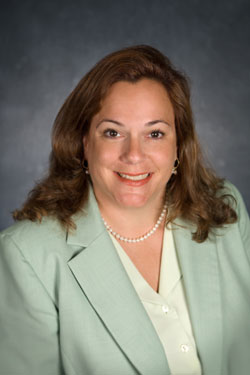
NEWPORT NEWS, VA. - Cynthia Keppel, a Hampton University experimental physicist and winner of the 2011 Virginia Outstanding Scientist Award, today was named Group Leader of Experimental Hall A at the U.S. Department of Energy's Thomas Jefferson National Accelerator Facility.
Hall A is one of four experimental halls at Jefferson Lab, a world-leading nuclear physics research facility located in Newport News. As Group Leader, Keppel will oversee the physics research program in Hall A, this includes managing a research program, preparing budgets, staging and running experiments, and overseeing a staff of scientists, engineers, technical staff, students and visiting scientists. Keppel will begin her duties on July 1.
Keppel has been a professor at Hampton University since 1995 while also holding a joint appointment as a staff scientist at Jefferson Lab. Her research interests include experimental nuclear physics, nucleon structure, medical instrumentation, proton radiotherapy and medical physics. At Jefferson Lab, Keppel and the HU experimental nuclear physics group have done electron scattering experiments to study the fundamental structure of protons and neutrons. She has been the spokesperson for more than a dozen experiments and co-authored 190 peer-reviewed publications. She is also an active member of the Coordinated Theoretical-Experimental Project on Quantum Chromodynamics (CTEQ).
"We are extremely pleased that Thia has agreed to join Jefferson Lab as a Group Leader," said Lab Director Hugh Montgomery. "She's an outstanding scientist, teacher and leader, qualities that were key in our worldwide search. She will have a central role as we prepare to double the power of our accelerator to 12 GeV and embark on a new era of experimentation in pursuit of our mission to learn more about the nuclear structure of the visible universe."
"Thia Keppel's merits, in both science and management, speak for themselves," added Rolf Ent, associate director for experimental physics. "We are fortunate to have her accept the Hall A leader position, with exciting scientific prospects. I would like to also acknowledge the work of the search committee chaired by Bob McKeown (deputy director, Science & Technology, Jefferson Lab) and Don Geesaman (associate director, Physics Division, Argonne National Laboratory), who performed an extensive and worldwide search."
At Hampton University, Keppel was involved in the development of medical applications of nuclear physics. She founded the HU Center for Advanced Medical Instrumentation (CAMI), where researchers concentrate on technology development for nuclear medicine, radiation therapy and other medical applications. Her work at CAMI resulted in seven awarded and six pending patents.
She also served as the scientific and technical director of the Hampton University Proton Therapy Institute (HUPTI). Additionally, she established and co-directed the HU joint medical physics program with the Eastern Virginia Medical School, the first medical physics program in Virginia and the only one at a historically black college.
Keppel received a bachelor's degree from Saint John's College in Annapolis, MD, and a master's degree and Ph.D. from The American University in Washington, DC in 1995.
Contact: Debbie Magaldi, Jefferson Lab Public Affairs, 757-269-5102, or
Dean Golembeski, Jefferson Lab Public Affairs, 757-269-7689

